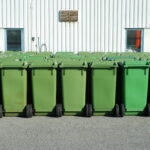The EPA recently upgraded the Food Recovery Challenge (FRC) website. Any business or organization can join the FRC as a participant or endorser. Participants help prevent food waste by setting and tracking food waste reduction goals that follow the EPA Food Recovery Hierarchy. Endorsers help educate organizations and businesses about the environmental costs of food…
The Barnstable Patriot reported on a recent food waste workshop for Cape Code health officials, waste haulers, composters, businesses, and institutions. The session, led by RecyclingWorks staff Heather Billings, focused on strategies for navigating the Massachusetts Commercial Organics Waste Ban. The ban, which applies to businesses that generate one ton or more of food waste…
Wicked Local Framingham reported in September on Framingham State University’s food donation program. Meghan Skeehan, a graduate student in food and nutrition, founded a Food Recovery Network chapter at the school in 2013. The university has since donated about 2,500 pounds of food from the dining hall to local homeless shelters and food pantries. Most…
A recent article in the telegram.com spotlights food donation programs at College of the Holy Cross, Becker College, Nichols College, and Framingham State University. These colleges have joined the Food Recovery Network. This national organization that helps recover perishable food from colleges for donation to people in need. Each school now donates some of the…
A recent article in MetroWest Daily News describes how the Massachusetts Commercial Organics Waste Ban has the potential to help address the problem of food insecurity in the state. The article is written by the CEO, David B. Waters, of Community Servings. Waters’ organization transforms what many consider “food waste” into meals for people homebound by…
The MetroWest Daily News reports that Framingham State recently became Food Recovery Certified. This certification recognizes business that donate surplus food to non-profit food recovery organizations. Framingham State is the second entity in Massachusetts to attain this certification. Their surplus food is delivered to Pathways Family Shelter and Pearl Street Shelter. Food Recovery Certified businesses…
An article by Lauren Palumbo, Chief Operating Officer of the Boston-based food Rescue Organization Lovin’ Spoonfuls, describes how grocers can help solve the problem of food waste while benefiting their bottom line. Food rescue organizations help connect grocery stores, wholesalers, and farms with social service entities that serve those in need. By donating food, grocers…
Students at Emerson College created a short documentary that follows Food For Free, a food rescue organization based in Cambridge, as they capture donated food and distribute it to those in need. RecyclingWorks in Massachusetts assists businesses and institutions with recycling and food waste reduction through composting and food donation. To speak to a recycling…
The Harvard Food Law and Policy Clinic has posted three legal fact sheets for food donation in Massachusetts. The topics include: Date Labeling Tax Incentives Liability Protections As long as food is donated in good faith and date labeling rules are followed, there are ample liability protections for food donors. All businesses qualify for some…
An article in MassLive describes how the Boston Public Market, which opened this week, will donate surplus food and compost food scraps. The Boston Public Market is a year-round marketplace for local food with over 35 vendors. Two food rescue organizations, The Greater Boston Food Bank and Lovin’ Spoonfulls, will help distribute surplus food from…

